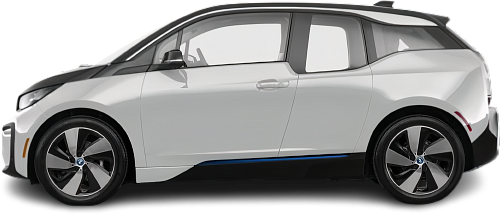USA EV Comparison: BMW i3 BEV 60 Ah vs Porsche Taycan 4S
Struggling to Decide? Let AI Help!
Your AI Summary Is Ready!
General Info
Since both vehicles have been discontinued, they are now only available on the used car market. You can get the BMW i3 BEV 60 Ah (2013-2017) for as low as $4500, while the Porsche Taycan 4S (2020-2024) begins at $45371.
The BMW i3 BEV 60 Ah (2013-2017) is a Hatchback, whereas the Porsche Taycan 4S (2020-2024) is a Sedan.
| Property | BMW i3 BEV 60 Ah | Porsche Taycan 4S |
|---|---|---|
| Years of Production | 2013-2017 | 2020-2024 |
| Current Status | Discontinued | Discontinued |
| Country of Manufacture | Germany | Germany |
| Body Style | Hatchback | Sedan |
| Market Availability | EU, USA | EU, USA |
| Price USA (Used) | $4500 | $45371 |
| GCC Score | 4.9 | 6.3 |
Range and Efficiency
While the Porsche Taycan 4S (2020-2024) offers a longer real-world range and a bigger battery, it is less energy-efficient than the BMW i3 BEV 60 Ah (2013-2017).
| Property | BMW i3 BEV 60 Ah | Porsche Taycan 4S |
|---|---|---|
| Range (EPA) | 81 mi | 206 mi |
| Range (WLTP) | - Range (WLTP) | 282 mi |
| Range (GCC) | 83 mi | 214 mi |
| Battery Capacity (Nominal) | 21.6 kWh | 79.2 kWh |
| Battery Capacity (Usable) | 18.8 kWh | 71 kWh |
| Efficiency per 100 mi | 22.7 kWh/100 mi | 33.2 kWh/100 mi |
| Efficiency per kWh | 4.41 mi/kWh | 3.01 mi/kWh |
| Range and Efficiency Score | 5.7 | 5.3 |
Charging
The Porsche Taycan 4S (2020-2024) features an advanced 800-volt architecture, whereas the BMW i3 BEV 60 Ah (2013-2017) relies on a standard 400-volt system.
The Porsche Taycan 4S (2020-2024) offers faster charging speeds at DC stations, reaching up to 223 kW, while the BMW i3 BEV 60 Ah (2013-2017) maxes out at 50 kW.
The Porsche Taycan 4S (2020-2024) features a more powerful on-board charger, supporting a maximum AC charging power of 9.6 kW, whereas the BMW i3 BEV 60 Ah (2013-2017) is limited to 7.4 kW.
| Property | BMW i3 BEV 60 Ah | Porsche Taycan 4S |
|---|---|---|
| Max Charging Power (AC) | 7.4 kW | 9.6 kW |
| Max Charging Power (DC) | 50 kW | 223 kW |
| Architecture | 400 V | 800 V |
| Charge Port | CCS Type 1 | CCS Type 1 |
| Charging Score | 3.8 | 7.5 |
Performance
The BMW i3 BEV 60 Ah (2013-2017) is rear-wheel drive, while the Porsche Taycan 4S (2020-2024) offers an all-wheel drive system.
The Porsche Taycan 4S (2020-2024) boasts greater motor power and accelerates faster from 0 to 60 mph.
| Property | BMW i3 BEV 60 Ah | Porsche Taycan 4S |
|---|---|---|
| Drive Type | RWD | AWD |
| Motor Type | PMSM | PMSM (front), PMSM (rear) |
| Motor Power (kW) | 125 kW | 390 kW |
| Motor Power (hp) | 168 hp | 523 hp |
| Motor Torque | 184 lb-ft | 472 lb-ft |
| 0-60 mph | 7 s | 3.8 s |
| Top Speed | 93 mph | 155 mph |
| Performance Score | 3.2 | 6.6 |
Dimensions
The Porsche Taycan 4S (2020-2024) is longer and wider, but the BMW i3 BEV 60 Ah (2013-2017) is taller.
The Porsche Taycan 4S (2020-2024) boasts a more extended wheelbase.
| Property | BMW i3 BEV 60 Ah | Porsche Taycan 4S |
|---|---|---|
| Length | 157.4 in | 195.4 in |
| Width (with Mirrors) | 80.3 in | 84.4 in |
| Width (w/o Mirrors) | 69.9 in | 77.4 in |
| Height | 62.1 in | 54.3 in |
| Wheelbase | 101.2 in | 114.2 in |
Cargo and Towing
A frunk (front trunk) is available in the Porsche Taycan 4S (2020-2024), but the BMW i3 BEV 60 Ah (2013-2017) doesn’t have one.
Neither vehicle is officially rated for towing in the US.
| Property | BMW i3 BEV 60 Ah | Porsche Taycan 4S |
|---|---|---|
| Number of Seats | 4 | 5 |
| Curb Weight | 2866 lb | 4771 lb |
| Cargo Volume (Trunk) | 9.2 ft3 | 14.4 ft3 |
| Cargo Volume (Max) | 38.8 ft3 | - Cargo Volume (Max) |
| Cargo Volume (Frunk) | - Cargo Volume (Frunk) | 3 ft3 |
| Towing Capacity | - Towing Capacity | - Towing Capacity |
| Cargo and Towing Score | 4.2 | 4.9 |




